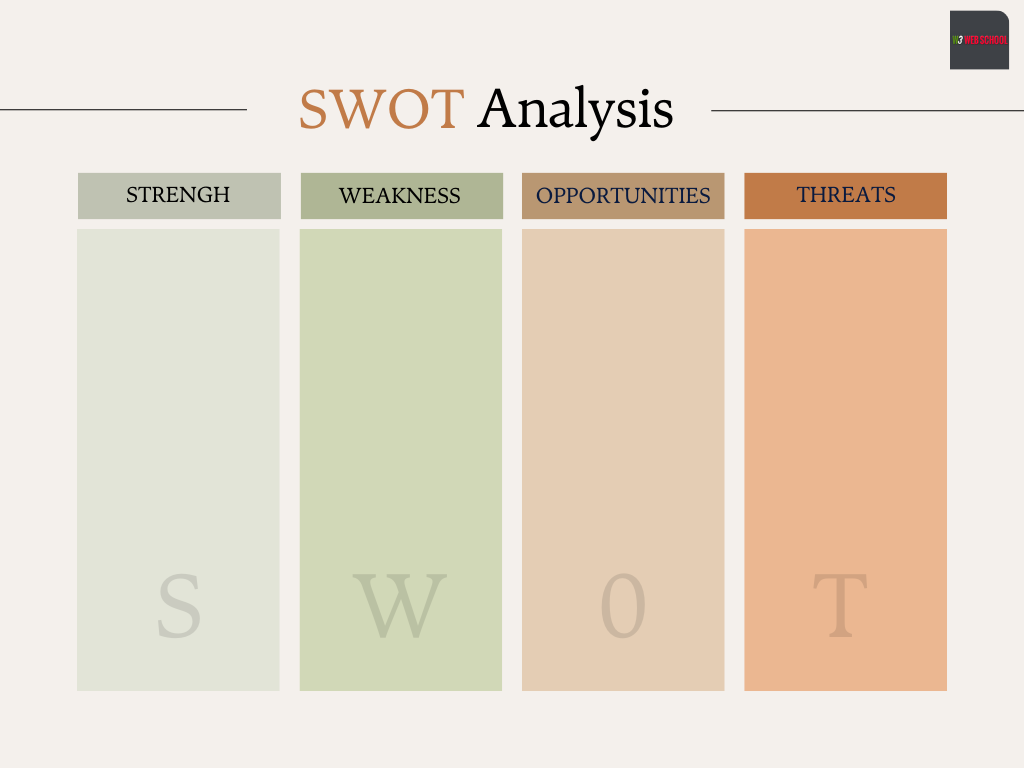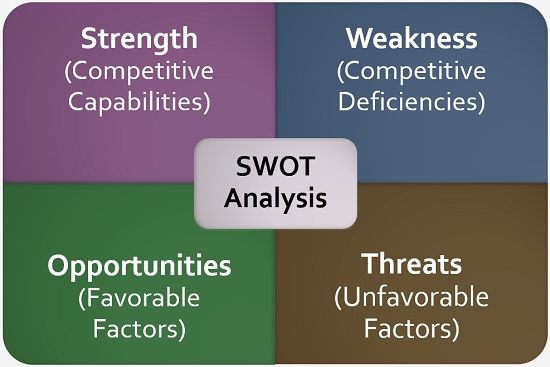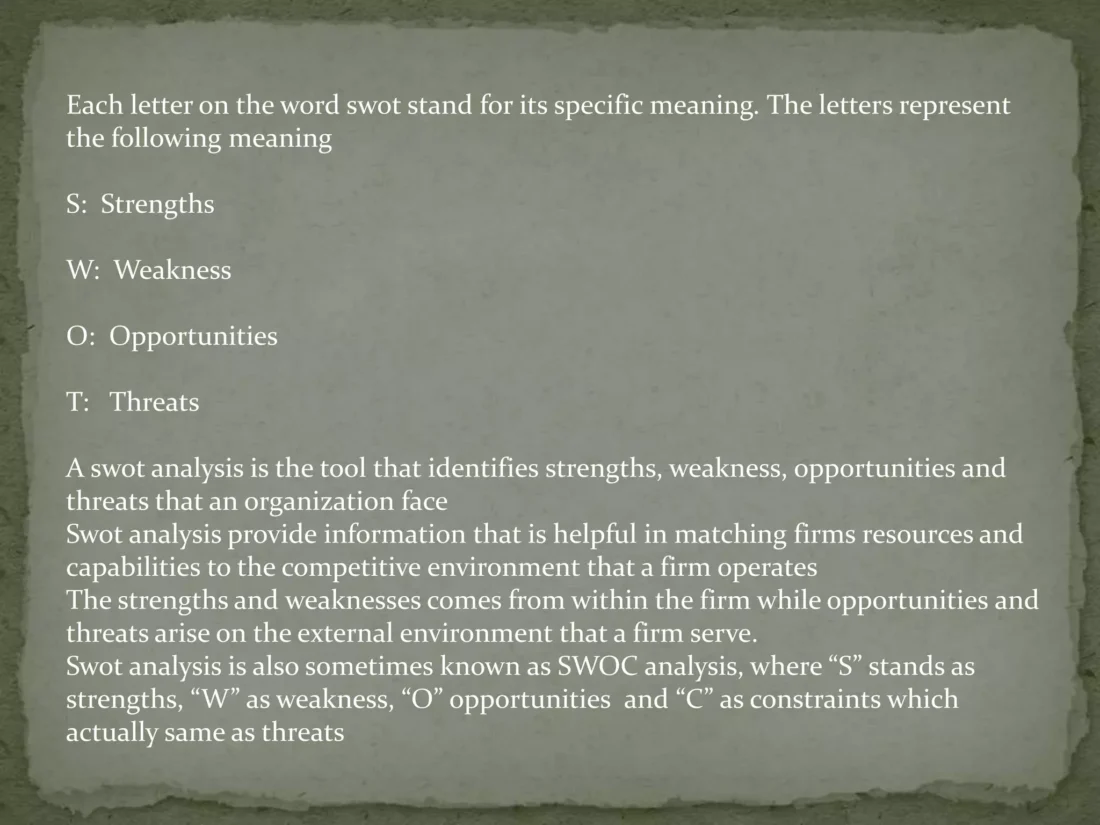Importance of SWOT Analysis is effective tools for any business for its decision-making. SWOT analysis helps you make internal as well as external analyses about any business. SWOT stands for Strengths, Weaknesses, Opportunities, and Threats.

Importance of SWOT Analysis helps you in Various things:
- Build up Strength (s)
- Minimise Weakness (w)
- Know you Opportunity (o)
- Counteract Threats (T).
Importance of SWOT helps in analyzing the key areas of your business like your Strengths, weaknesses, opportunities and threats. Swot is designed in a way to take advice for real-life events and areas from the different stakeholders and analyze the weaknesses and threats of a business.
Using SWOT analysis in your business
Using the Importance of SWOT analysis in your business can be valuable for strategic planning and decision-making. Here’s a step-by-step guide on how to effectively apply SWOT analysis for your business Internally and Externally.

- Conduct an internal assessment to identify what your business does well.
- Consider your unique assets, skills, and resources that give you a competitive advantage.
- Examples could include a strong brand, skilled workforce, cutting-edge technology, loyal customer base, or efficient processes.
- Analyse external factors and trends in the business environment that could benefit your business.
- Consider emerging markets, changes in consumer Behaviour, technological advancements, or partnerships that could create growth opportunities.
- Examine external challenges and potential risks that could affect your business.
- Think about competition, economic fluctuations, regulatory changes, natural disasters, or negative publicity that might pose threats.
- Analyse external factors and trends in the business environment that could benefit your business.
- Consider emerging markets, changes in consumer behaviour, technological advancements, or partnerships that could create growth opportunities.
Reason why SWOT Analysis is important for your business
SWOT analysis helps you to review your business completely. It helps you to make a strategic decision making and planning of a Future event.
- It will help you to do strategic planning for future product launching
- It helps you to plan or reframe your business updates.
- It helps you to minimise risk for your business.

Some Limitation for SWOT Analysis for you business
- SWOT Analysis give you many ideas but don’t tell you which idea is best for your business
- SWOT analysis gives you many ideas but not all business ideas are helpful for us.
- SWOT analysis is subjective to the one who is conducting the analysis.
- SWOT analysis tends to be focused on the current situation and often doesn’t provide guidance on how to plan for the future
- SWOT analysis often separates internal and external factors, but in reality, they are interconnected
Importance of Conducting a SWOT Analyze
The importance of SWOT analysis is a strategic planning tool utilized by businesses to evaluate their current situation and make informed decisions.
SWOT consists of Strengths, Weaknesses, Opportunities, and Threats.
1. Define the Objective: Clearly state the purpose of the SWOT analysis, whether it is for an organization or which department.
2. Gather a Team: It is often helpful to involve key stakeholders, team members, or subject matter experts who possess knowledge about the subject being analyzed. This diversity of perspectives can provide a more comprehensive view.
Determine the key advantages that your organization, project, or product possesses.
- What is advantage you have as a organization, project or product?
- What do you do better than your competitors?
- What positive aspects have been created in past performance?
- Determine the limitations that your organization, project, or product faces. Are there areas where you lack resources or expertise?
- What do your competitors do better than you?
- What negative aspects have been highlighted in past performance?
Determine the external factors or trends that could benefit your organization or project.
- Are there emerging markets or technologies that you can leverage?
- Are there changes in customer-behaviour or preferences that you can exploit?
- Are there gaps in the market that you can fill?
- What external factors or trends could pose challenges or threats to your organization or project?
- Are there competitors entering your market?
- Are there economic, regulatory, or environmental factors that could harm your operations?
- Are there changing customer demands or preferences that could negatively impact your business?
Prioritize and Analyze:
Once you have a list of strengths, weaknesses, opportunities, and threats, prioritise them based on their importance and potential impact. Consider the interplay between these factors.
For example, can you leverage strengths to capitalize on opportunities or mitigate weaknesses to address threats?
Develop Strategies:
Use the insights from your SWOT analysis to develop strategic initiatives and action plans. Consider how you can maximize your strengths and opportunities, minimize weaknesses, and mitigate threats. These strategies should align with your organizational goals.
Communicate and Implement:
A SWOT analysis is not a one-time exercise. Continuously monitor and review your analysis to ensure it remains relevant. Market conditions and internal factors can change, so it’s important to adapt your strategies accordingly.
Communicate and Implement: Share the findings of your SWOT analysis with relevant stakeholders and ensure that the strategies derived from it are communicated and implemented throughout your organisation.

In W3webschool you can learn SWOT analysis and other business tricks which will help business to reach top-level.